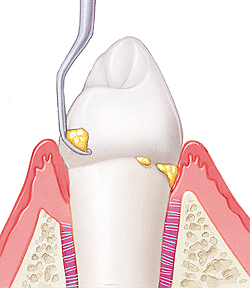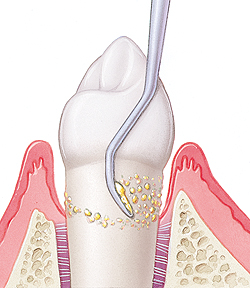Periodontal Disease: Nonsurgical Treatments

Scaling at and just below the gumline reaches tartar deposits that can't be removed in an ordinary dental cleaning.
Some treatments for periodontal disease do not involve surgery. The goal of these treatments is to create conditions that enable tissues in the mouth to heal. This is done by reducing plaque, infection, and other causes of periodontal disease. About 4-8 weeks after starting a treatment, you'll have an evaluation by your dental care provider. Depending on various factors, surgery may be the next step.
Scaling and Root Planing
This treatment is performed by a dentist or a dental hygienist. Sometimes a special ultrasonic device is used to remove heavy deposits. Then plaque and tartar are removed (scaling), and the root surfaces are smoothed (root planing). This helps keep the area free of bacteria. It may also help ligaments that have broken down to reattach to the teeth. This reduces the depth of pockets that have formed in the gums around the teeth.
Antibiotics
Infection can be treated with antibiotics, which decrease bacteria. Pills may be prescribed. Or the antibiotic may be placed directly into the infected pocket.

Root planing smoothes rough spots on the roots where bacteria collect.
Bite Correction
Bite problems such as an uneven bite can worsen bone loss. Grinding or clenching the teeth may contribute to the problem. A splint or other ways of adjusting the bite can reduce pressure and help control the damage.
About Home Care
Home care is your best weapon against periodontal disease. Daily brushing and flossing can help improve your gum health. This can prevent tooth loss, and may also help you avoid surgery. It's easy to make a habit of brushing and flossing-and it's not too late to start! Ask your dentist to show you the right way to brush and floss.






